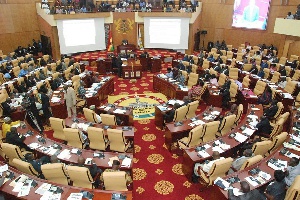The legislative arm of Government had still not been unable to reach the 30% mark set by the United Nations, as the proportion of women in Ghana’s parliament was still hovering around 10% of the total membership of the House.
Mr Ekow Hayford, MP for Mfantseman Constituency, in a statement on the floor, said women representation has become a very pressing issue in the international domain for a very long time.
“From the inception of the 4th Republic, women representation in Ghana’s parliament has been low,” Me Hayford noted.
Ghana made marginal progress in the 2016 election by increasing the number of elected women from 30 (10.9%) in 2012 to 37 (13.5%), but this is still less hat half of the 30% threshold; and women’s participation in legislatures continues to be a matter of debate in society, despite the many struggles and salient roles they have played in furthering democracy in Ghana.
Mr Hayford advanced reasons such as the strong male presence in political life, which also largely formulate the rules of engagement and define the standards of evaluation, limited financial support from political parties, limited access to political networks and very stringent standards of qualifications applied to women discourage active women participation in the political process.
Also, lack of access to education and training systems for women’s leadership in general, and for orienting the young women towards political life, and the nature of the electoral system, not favourable to women, all contribute to the under representation of women in parliament.
The Mfantseman Constituency MP further advanced socioeconomic challenges, ideological and psychological, cultural patterns and the predetermined social assigned roles to women and men, as well as lack of confidence by women to stand elections as reasons for the little presence of women in the House.
“Traditions continue to emphasize women’s primary role as mothers and housewives and to restrict them to those role,” Mr Hayford said, adding that “a traditional strong, patriarchal value system favours sexually segregated roles, and ‘traditional cultural values’ militate against the achievement, progress and participation of women in any political process.”
Mr Hayford questioned the notion of women playing only the role of working mothers and the situation in some countries where men dictate to women how to vote.
“This has jarred their confidence in their ability to participate in the political process” and suggested to political parties to present more women in their strongholds to contest the parliamentary elections, and the adoption of seats-at-large through constitutional reforms.
Also, the setting up of mechanism like the Commonwealth Women Parliamentarian Chapters, in parliament to act as a wheel for deliberation and advancement of women empowerment.
Parliament should also endeavour to build the capacity of its members, especially women through training initiatives, which should be aimed at equipping women MPS with the necessary skills on public policy, managing and working with the media.
Mr Hayford called on Parliament to rank the needs of women and give equal opportunities to them to take up leadership responsibilities that will increase their participation in Parliament, society and the world as a whole.
General News of Wednesday, 12 December 2018
Source: ghananewsagency.org













